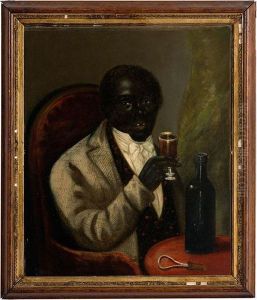Tom Molineaux Paintings
Tom Molineaux, also known as Thomas Molineaux, was an African-American boxer who was born into slavery in Virginia in 1784. He was reputedly granted his freedom after winning a fight that had been arranged by his slaver owner. Molineaux's abilities in the ring were quickly recognized, and after securing his freedom, he moved to England around 1809 to pursue a career as a professional boxer at a time when the sport was not yet fully codified and often operated under bare-knuckle rules.
In England, Molineaux's career began to flourish. He quickly made a name for himself in the boxing circles and challenged the reigning English champion, Tom Cribb, in 1810. Their first match was highly contested, and there were allegations of foul play when Molineaux nearly won. A rematch was organized, and in 1811 Tom Cribb defeated Molineaux again in a brutal contest that solidified Cribb's standing as a national champion and left Molineaux's career somewhat tarnished.
Despite his losses to Cribb, Molineaux remained a significant figure in the history of boxing. He was one of the first internationally recognized African-American athletes and laid the groundwork for the future of the sport. His life after the Cribb fights, however, was marked by a decline. Struggling with finances and health issues, Molineaux continued to fight but with less success. His last recorded fight was in 1815, and he died just three years later in 1818 in Galway, Ireland, under impoverished circumstances.
Tom Molineaux's legacy is one of a pioneering athlete who overcame the bonds of slavery and emerged as a prominent figure in early boxing history. Despite the racial discrimination he faced, his skill and determination in the ring have earned him a lasting place in the annals of the sport. Molineaux's life and career have been the subject of various historical accounts, emphasizing his role in challenging the racial barriers of his time and his contributions to the development of boxing as a professional sport.
